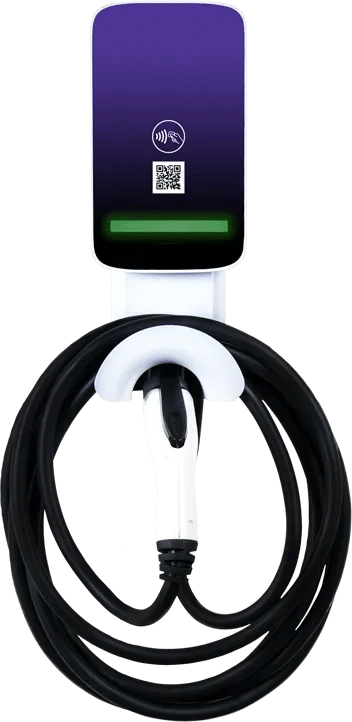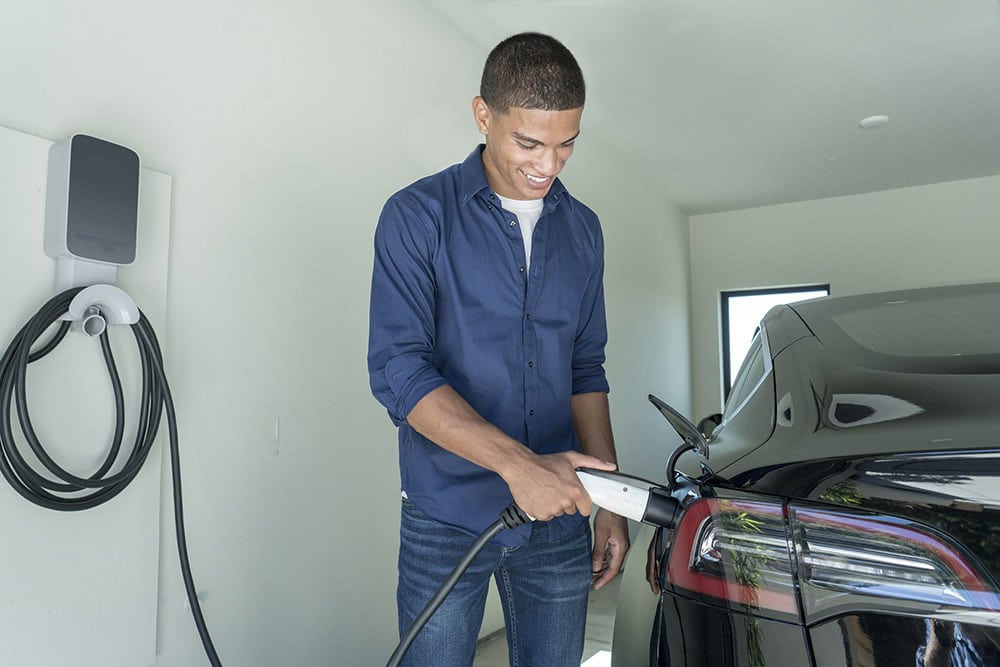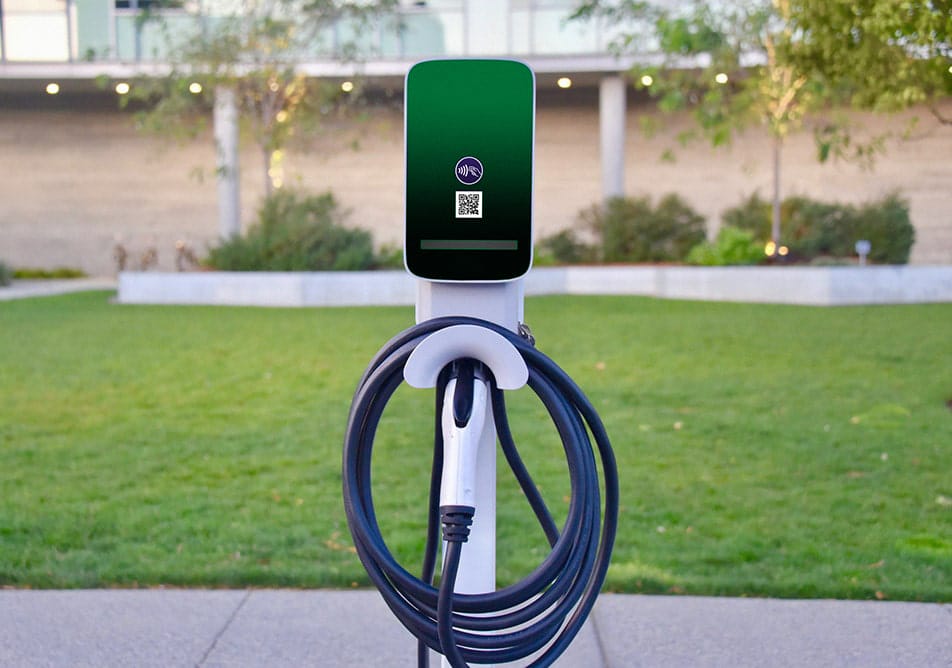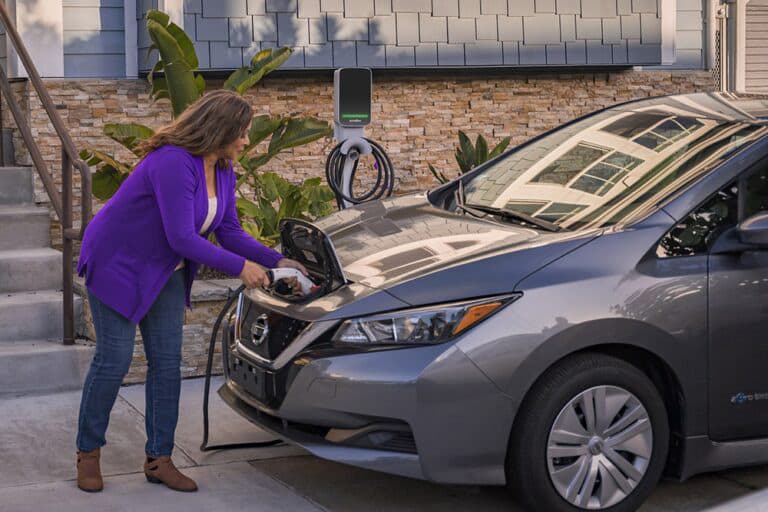Residential EV Chargers

EV Chargers for Single Family Homes & Multiunit Family Housing
Our EV charger lineup offers flexible installation options and a wide variety of available products so that you can find the right EV charger for your vehicle and home. Compatible with a smartphone or smart-home device to check charging status, make payments, and more. The program incentivizes users to implement eco-friendly practices by putting money back into your pocket when charging your vehicle during optimal times.
Get a QuoteLevel 2 EV Charging
Level 2 chargers require a dedicated 240-volt circuit (like what you use for a dryer); therefore, most homes in America can easily hook up a charging station without upgrading the service. Most residential owners are well served to charge their EV overnight using a 40-amp unit, but for those looking for more amperage (more power and a faster charge) or commercial use, a Level 2 charger with 48-amps is your go-to. Higher amperage requires a heavier gauge wire to handle the flow, so additional costs are associated with upgrading the dedicated circuit from the breaker box.
If you rent or own a condo or townhouse, you will need written permission from the association, landlord, and owner to make any electrical upgrades. We are happy to consult with management at multiunit home dwellings, business owners, etc., to facilitate further the procurement of EV infrastructure for residents and clientele. We will help owners determine which product best suits their settings and verify if any service upgrades are required. We will also keep you informed of any federal, state, and local utility incentives that may be available.

Level 2: Plug-In Vs. Hard Wire
Each has pros and cons, but it really depends on which is best for your lifestyle and home environment. Contact us for questions or get an estimate for an EV Quote.

Plug-In EV Charging
- Is a portable charger allowing you to insert the plug from your EVSE into any 240V outlet.
- Run wiring from your home’s electrical panel to the new outlet (garage/outside/etc.).
- Can use the 240V outlet for other purposes (power equipment, etc.).
- Is generally less expensive and more convenient to install.
- The National Electrical Code requires a ‘While-in-Use’ weatherproof cover for outdoor usage.
- Doesn’t charge as fast as hardwire stations.
- Nuisance tripping of the circuit may occur (the GFCI wall outlet and the internal GFCI of the charger may conflict.)

Hardwire EV Charging
- Run wiring from your home’s electrical panel to the charger.
- High-power, continuous devices mounted to the wall without worrying about coming loose.
- More amperage/faster charging.
- Watertight connection, great for outdoor use.
- Are not portable; an electrician must install and rehome as needed.
- With larger cables, it is more labor-intensive to install, and the chargers are usually more costly.
We Are an EV Charger Authorized Reseller

In Stock, Ready to Ship Level 2 EV Chargers
Electrification is evolving, and figuring out what you need for your home or business can be complicated and overwhelming. Our certified team takes the stress out with honest and educated reviews and consultation to help you determine the most effective EV charger infrastructure for your needs.
There are three charging levels for EVs and plug-in hybrids. The higher the level, the faster and more powerful the charging power becomes. Keep in mind the EV determines how much power it can receive and at what speed it allows to charge its battery, so you don’t need to worry about a charger delivering too much power to your vehicle.
Level 1
Chargers use a standard 120-volt household outlet. These are the slowest and weakest chargers; thus, most don’t bother with them.
Level 2
Chargers charge up to ten times faster, and they are the most common for daily charging in households today. They require a 240V outlet, which most garages today already have. This is the standard method for public and private charging stations at workplaces, shopping plazas, etc. You may hire an electrician to install a 240V outlet for a plug-in charger or hardwire a Level 2 charger.
Level 3
Chargers offer the fastest type of charging available and use direct current (DC), unlike the other levels, which use alternating current (AC). Level 3 or DC-Fast Chargers typically charge an EV battery to 80 percent in about 20-30 minutes. Most homes and small businesses don’t have the high-voltage supply required for Level 3 charging; thus, they are common in dense commercial or industrial settings for paid or free use.
Benefits of Offering EV Charging at Multifamily Housing

Attract & Attain Residents

Reduce Energy Costs

Meet Sustainability Goals

Fast EV Charging without Costly Grid Upgrades

Enhance Residence Experience
Safe, Reliable, and Easy to Use Chargers
Schedule an EV Installation